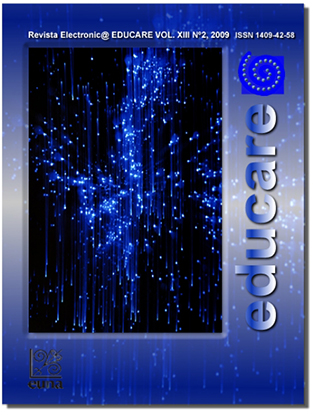Pedagogía, diversidad y lenguaje: develando los colores en miradas aprendientes
DOI:
https://doi.org/10.15359/ree.14-1.8Keywords:
education, pedagogy, diversity, language, communication, learningAbstract
In the constant change in which we live in, Pedagogy, as a science of education, science of relationships among human beings, is the product of agreements, of communication processes, socio-cultural processes intertwined in a complex manner. The attention to diversity is a growing concern in plural environments and societies, and language, as a cultural trait, allows both the description of our circumstances and the considerations to understand them, to provide new significance to the present, to value the past and to imagine the future. If we take into account that speech is only one of the manifestations of language, if the diverse ways of the body’s expression constitute types of language, the need to consider how we communicate in education processes is imposed on us.
References
Eisler, R. (1998). Placer sagrado. Nuevos caminos hacia el empoderamiento y el amor. Volumen 2.
Santiago, Chile: Editorial Cuatro Vientos.
Flores, L. E. (2007). Educación y equidad de género. San José, Costa Rica: Universidad de La Salle.
Flórez, R. (2005). Pedagogía del conocimiento. Bogotá, Colombia: McGraw Hill.
Flórez, R. (1999). Evaluación Pedagógica y Cognición. Bogotá, Colombia: McGraw Hill.
Flórez, R. y Tobón, A. (2001). Investigación educativa y pedagógica. Bogotá, Colombia: McGraw
Hill.
Frei Betto. (1998). La obra del artista. Una visión holística del universo. Madrid, España: Ediciones
Barbarroja.
Maturana, H. (1989). Emociones y lenguaje en educación y política. Santiago, Chile: Dolmen
Ediciones.
Maturana, H. (1999). Transformación en la convivencia. Santiago, Chile: Dolmen Ediciones.
Downloads
Published
How to Cite
Issue
Section
License
1. In case the submitted paper is accepted for publication, the author(s) FREELY, COSTLESS, EXCLUSIVELY AND FOR AN INDEFINITE TERM transfer copyrights and patrimonial rights to Universidad Nacional (UNA, Costa Rica). For more details check the Originality Statement and Copyright Transfer Agreement
2. REUTILIZATION RIGHTS: UNA authorizes authors to use, for any purpose (among them selfarchiving or autoarchiving) and to publish in the Internet in any electronic site, the paper´'s final version, both approved and published (post print), as long as it is done with a non commercial purpose, does not generate derivates without previous consentment and recognizes both publisher's name and authorship.
3. The submission and possible publication of the paper in the Educare Electronic Journal is ruled by the Journal’s editorial policies, the institutional rules of Universidad Nacional and the laws of the Republic of Costa Rica. Additionally, any possible difference of opinion or future dispute shall be settled in accordance with the mechanisms of Alternative Dispute Resolution and the Costa Rican Jurisdiction.
4. In all cases, it is understood that the opinions issued are those of the authors and do not necessarily reflect the position and opinion of Educare, CIDE or Universidad Nacional, Costa Rica. It is also understood that, in the exercise of academic freedom, the authors have carried out a rogorous scientific-academic process of research, reflection and argumentation thar lays within the thematic scope of interest of the Journal.
5. The papers published by Educare Electronic Journal use a Creative Commons License:














 The articles published by Educare Electronic Journal can be shared with a Creative Commons License:
The articles published by Educare Electronic Journal can be shared with a Creative Commons License: 



